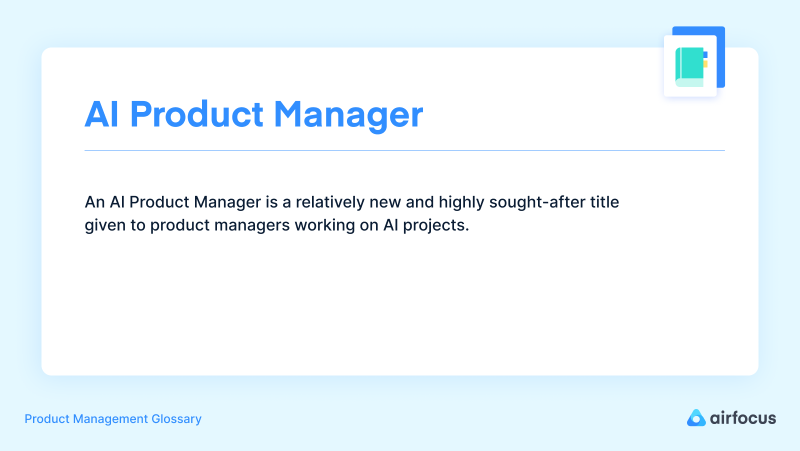AI Product Manager
What is an AI product manager?
AI Product Manager definition
An AI Product Manager is a relatively new and highly sought-after title given to product managers working on AI projects.
AI Product Managers perform a similar role to traditional product managers but often come from different backgrounds. For example, a traditional PM will usually have a background in UX or marketing. An AI PM will often come from a data processing or statistics background.
What is the role of an AI product manager?
An AI product manager oversees the development and launch of artificial intelligence (AI) products. This involves working closely with cross-functional teams, including engineers, data scientists, designers, marketers, and business stakeholders, to ensure that the AI product meets customer needs and reflects the company’s values.
The role of an AI product manager involves a wide range of responsibilities but generally includes the following:
Defining the product vision and strategy
Conducting market research and customer analysis
Prioritizing features and functionality
Overseeing the product development process from ideation to launch
Additionally, AI PMs are responsible for defining KPIs and measuring the product's success over time.
Other key responsibilities of an AI product manager include staying up-to-date with the latest AI technologies and industry trends. They will identify innovation and product differentiation opportunities while ensuring that the product complies with legal and ethical guidelines.
Overall, the AI product manager plays a critical role in driving the development and success of AI products and requires a combination of technical expertise, business acumen, strong leadership, and communication skills.
What is the average salary of an AI product manager?
As with any role, the salary of an AI product manager will vary based on location, experience, and the local job market. It’s also worth noting that the AI PM role is relatively new, so average wages are still being established.
As of February 2023, the average salary for an AI product manager in the US is around $120,000 annually.
In Europe, an AI PM’s salary is highly dependent on location, with France offering roughly €130,000 per year, while Germany and the UK offer a much lower €67,000 and £56,400, respectively.
What skills does an AI product manager need?
An AI product manager needs to have a deep understanding of artificial intelligence and machine learning. They should know how the product works, what it does, how it improves a customer’s experience, and what role AI will play within the product.
A successful AI product manager also needs to possess various non-technical skills. These include project management skills to manage the development lifecycle of AI products, strong communication skills to effectively communicate with technical and non-technical stakeholders, and leadership skills to lead cross-functional teams and bring AI products to market.
Additionally, data analysis skills are essential to collect and analyze data to make informed product decisions, while strategic thinking is necessary to identify and prioritize opportunities for AI product development. Problem-solving skills are also key to overcoming technical challenges and mitigating risks. User experience design skills are essential to creating user-friendly products that meet customer needs.
Overall, a successful AI product manager should be able to balance technical expertise with business know-how and strong leadership skills to bring successful AI products to market.
How to become an AI product manager?
We expect to see a huge influx of AI Product Manager roles being added to businesses over the next couple of years. As the new “hot” career, it will be tough for applicants to stand out.
The best way to get ahead is to start working towards building up specialty knowledge in artificial intelligence, machine learning, and neural networks. Consider an online training course that can teach you everything you need to know and give you a certification that will impress interviewers.

General FAQ

Glossary categories
Experience the new way of doing product management

Experience the new way of doing product management








